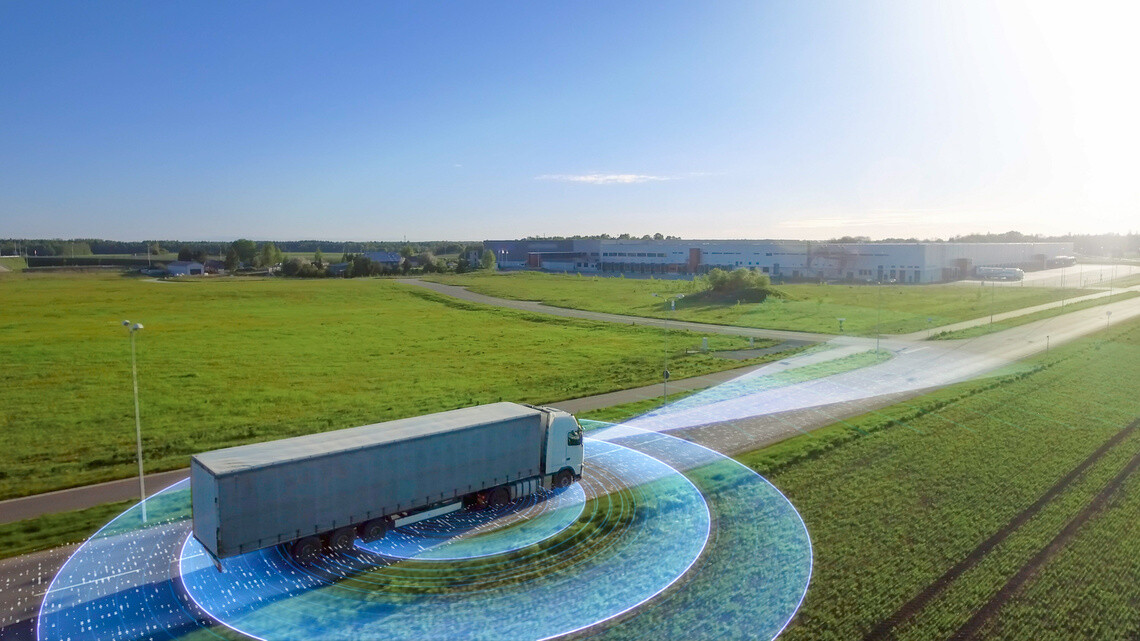
00 our advice on securing your truck fleet connectivity and avoiding vehicle hacking
Transport and logistic concept, Manager and engineer checking and control logistic network distribution and data on tablet for logistic Import export on motorway background
If you own a small or medium-sized fleet, cyber attacks might not seem like a top concern. Many believe such attacks only target large companies with vast data or resources. However, cyber attacks can cost businesses of any size an average of £1,205.1 In 2024, IBM reported the average cost of a data breach in the UK reached £3.58 million, a 5% increase from the previous year!2 Jonathan Hervault, Technical Architect at MICHELIN Mobility Intelligence, recently sat down with us to discuss the importance of cyber security as well as best practices for keeping your fleet data secure.

Jonathan hervault gave us his insights on cyber security for trucks
Jonathan Hervault, Technical Architect at MICHELIN Mobility Intelligence
Jonathan Hervault, Technical Architect at MICHELIN Mobility Intelligence
Cyber attacks pose a risk to fleets of all sizes - large and small
Last year, 22% of all companies faced cyber threats, but this number skyrocketed to 45% for medium-sized businesses.3
In 2023, the transport sector ranked as the 8th most targeted sector for cyber attacks.4 The sector, including both small and large fleets, is a prime target, especially as connected vehicles become more prevalent.
“Small and medium-sized enterprises (SMEs) are prime targets for cyber attacks because they are generally easier to breach,” says Jonathan. Most SMEs, including fleets, are focused on their core operations and often lack dedicated cyber security teams, making their fleet data more vulnerable. While large companies face frequent attacks, SMEs are often hit the hardest. “In fact, 85% of the 385,000 reported cyber attacks in France targeted SMEs5,” says Jonathan, highlighting how attackers often prioritise smaller businesses, knowing they tend to have weaker defences.
Why fleet owners need to keep an eye out for cyber attacks
Hackers targeting the transport and logistics industry today typically fall into two categories. Most are financially motivated, aiming to disrupt operations and demand a ransom. There's also a growing trend toward data theft, where cyber criminals infiltrate systems and quietly collect valuable information over time. For fleets, this could include route planning data, which could be sold for nefarious purposes, such as knowing the paths of armoured vehicles used for cash-in-transit work. Personal data of drivers and customers is also at risk.
Additionally, ideologically motivated attacks are on the rise, exemplified by the 2022 hack of Yandex Taxi in Russia6. In this incident, attackers exploited the company’s account creation system, triggering a flood of ride requests that led to a massive traffic jam—intended as a form of protest. In the transport sector, similar disruptions could be orchestrated to send a message, with potentially global consequences for cargo and logistics.
Practical steps to protect your fleet from cyber attacks
While cyber attacks are a growing threat, there are practical steps fleet owners can take to protect their businesses. “The first and most important line of defence isn’t technical ౼ it’s the people within your company,” says Jonathan. “Ensuring the cyber security of truck fleets through employee education is essential.” This can involve simple training on creating strong passwords, recognising phishing attempts and reinforcing that sensitive information should never be shared over the phone.
Phishing simulations are another effective tool to test your team's ability to spot fake attacks and ensure the cyber security of your truck fleet. Regularly running these simulations and testing fallback solutions on a small scale helps build a strong cyber culture and ensures your fleet is better prepared for real threats.
Securing fleet data: a critical step for your business
In addition to educating your team on cyber security for truck fleets, protecting your fleet data is equally vital. As trucks evolve with more advanced computer systems, drivers will soon begin regularly interacting with a growing number of Software Defined Vehicles, equipped with sensors and devices. These innovations bring significant benefits, like improved safety through fleet data collection and AI-driven accident prevention, but they also increase the potential for cyber security threats. Therefore, it's crucial to balance the advantages of this technology with the need for robust security measures to protect both the systems and the valuable data they generate. MICHELIN Mobility Intelligence, for example, can boost road safety by using AI to help fleets plan the safest itineraries to protect their drivers and goods.

Michelin mobility intelligence combines ai with fleet data to help fleets plan optimised itineraries
In these instances, data protection must be a priority. Regularly updating computer systems is essential, as no system is entirely secure. Vulnerabilities are constantly being discovered, and system updates are released to address them. Failing to apply these updates can leave your fleet exposed to cyber attacks.
“As a small or medium-sized fleet, the first step is to clearly define your specific needs before exploring the vast array of available solutions,” says Jonathan.” Avoid unnecessary complexity by focusing on what's truly essential for your business. When choosing a provider, Jonathan suggests prioritising security practices and looking for partners with robust cyber security measures in place. It is important to ensure cyber security is a key component of your service contracts as well by clearly outlining your expectations for data protection and security.
When it comes to cyber security be sure to stay proactive!
Cyber security has become a critical strategic issue for all businesses, regardless of size. As threats evolve rapidly, companies must adopt a proactive approach. Even with the best security measures, risks remain, so it’s important to plan for potential breaches. Simulating cyber attacks, ensuring backups and having a clear recovery plan in place are crucial steps. And of course, integrate a collaborative approach, focused on sharing information on threats and best practices to help you stay updated when it comes to the cyber security of truck fleets.
Safeguard your fleet data with MICHELIN solutions
Partnering with trusted experts in system design and security will further enhance your fleet’s resilience. With so many providers offering fleet connectivity tools, it's essential to find a partner which can tailor their offer to your exact requirements.” In this regard, solutions from Michelin have you covered.
MICHELIN Connected Fleet: Your fleet’s trusted partner
MICHELIN Connected Fleet, a leading expert in connected fleet solutions, empowers fleet managers with data-driven recommendations. These tailored solutions help owners reduce costs, enhance productivity, ensure driver safety and promote sustainable fleet management.
“As a leader in software development and IT security, Michelin has a deep understanding of risk management in cyber security,” says Jonathan. “Faced with daily cyber attacks, we have built robust defences and adapted practices to counter these threats.” This expertise extends to fleet management, encompassing areas such as planning, performance monitoring and securing critical data on speed, braking, temperature and tire sensors.
“Our systems are designed with security in mind from the outset—a principle we call ‘security by design’—to better protect fleets against potential threats,” he adds.
FAQ:
Cyber security is crucial for truck fleets in order to protect sensitive data (vehicle location, driver information and planning details). Breaches can cause financial loss, disrupt operations and harm a company’s image.
Cyber security uses tools, protocols and training to protect systems and data from hackers and attacks.
Cyber security involves established protocols to protect systems, networks and data to prevent unauthorised access and attacks.
Fleet data can include location data, maintenance data, vehicle data collected from cameras and sensors, routes and planning, driver behaviour and personal information.
These vehicles rely on software to manage operations, add new functionalities and enable new features, often updated over its lifetime via Over-The-Air updates. By integrating technologies such as AI, connectivity and advanced driver assistance systems, and using real-time data, SDVs evolve continuously, enhancing safety and adapt to changing needs.
1. GOV UK. Cyber security breaches survey. 2024
https://www.gov.uk/government/statistics/cyber-security-breaches-survey-2024/cyber-security-breaches-survey-2024
2. IBM. Soaring Data Breach Disruption Drive Costs to Record Levels. 2024
https://uk.newsroom.ibm.com/IBM-Report-Soaring-Data-Breach-Disruption-Drive-Costs-to-Record-Levels#:~:text=LONDON%2C%20UK%2C%2030%20July%2C,expand%20demands%20on%20cyber%20teams.
3. GOV UK. Cyber security breaches survey. 2024
https://www.gov.uk/government/statistics/cyber-security-breaches-survey-2024/cyber-security-breaches-survey-2024
4. Marsh McLennan Agency (MMA) // IBM Intelligence index. 2023
https://www.marshmma.com/us/insights/details/a-glitch-on-the-road-cybersecurity-trends-facing-the-trucking-and-transportation-industry.html
5. JEDHA. Les cyberattaques en France - Rapport 2024
https://www.jedha.co/formation-cybersecurite/rapport-sur-les-cyberattaques-en-france---mis-a-jour-en-2024
6. Security Affairs. Anonymous hacked Yandex taxi causing a massive traffic jam in Moscow
https://securityaffairs.com/135280/hacktivism/anonyomus-hacked-yandex-taxi.html

gettyimages 930571046
car going fast on a road by night







